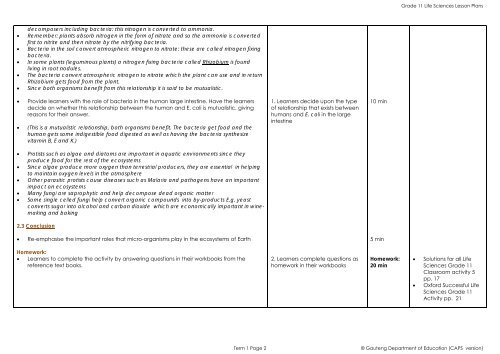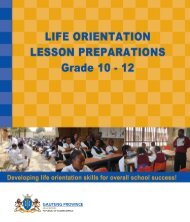Life Science Grade 11
Life Science Grade 11
Life Science Grade 11
Create successful ePaper yourself
Turn your PDF publications into a flip-book with our unique Google optimized e-Paper software.
<strong>Grade</strong> <strong>11</strong> <strong>Life</strong> <strong>Science</strong>s Lesson Plansdecomposers including bacteria: this nitrogen is converted to ammonia.• Remember: plants absorb nitrogen in the form of nitrate and so the ammonia is convertedfirst to nitrite and then nitrate by the nitrifying bacteria.• Bacteria in the soil convert atmospheric nitrogen to nitrate: these are called nitrogen fixingbacteria.• In some plants (leguminous plants) a nitrogen fixing bacteria called Rhizobium is foundliving in root nodules.• The bacteria convert atmospheric nitrogen to nitrate which the plant can use and in returnRhizobium gets food from the plant.• Since both organisms benefit from this relationship it is said to be mutualistic.• Provide learners with the role of bacteria in the human large intestine. Have the learnersdecide on whether this relationship between the human and E. coli is mutualistic, givingreasons for their answer.• (This is a mutualistic relationship, both organisms benefit. The bacteria get food and thehuman gets some indigestible food digested as well as having the bacteria synthesizevitamin B, E and K.)1. Learners decide upon the typeof relationship that exists betweenhumans and E. coli in the largeintestine10 min• Protists such as algae and diatoms are important in aquatic environments since theyproduce food for the rest of the ecosystems• Since algae produce more oxygen than terrestrial producers, they are essential in helpingto maintain oxygen levels in the atmosphere• Other parasitic protists cause diseases such as Malaria and pathogens have an importantimpact on ecosystems• Many fungi are saprophytic and help decompose dead organic matter• Some single celled fungi help convert organic compounds into by-products E.g. yeastconverts sugar into alcohol and carbon dioxide which are economically important in winemakingand baking2.3 Conclusion• Re-emphasise the important roles that micro-organisms play in the ecosystems of Earth5 minHomework:• Learners to complete the activity by answering questions in their workbooks from thereference text books.2. Learners complete questions ashomework in their workbooksHomework:20 min• Solutions for all <strong>Life</strong><strong>Science</strong>s <strong>Grade</strong> <strong>11</strong>Classroom activity 5pp. 17• Oxford Successful <strong>Life</strong><strong>Science</strong>s <strong>Grade</strong> <strong>11</strong>Activity pp. 21Term 1 Page 2© Gauteng Department of Education (CAPS version)







